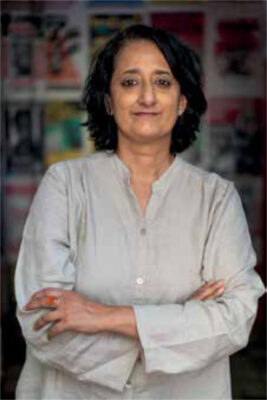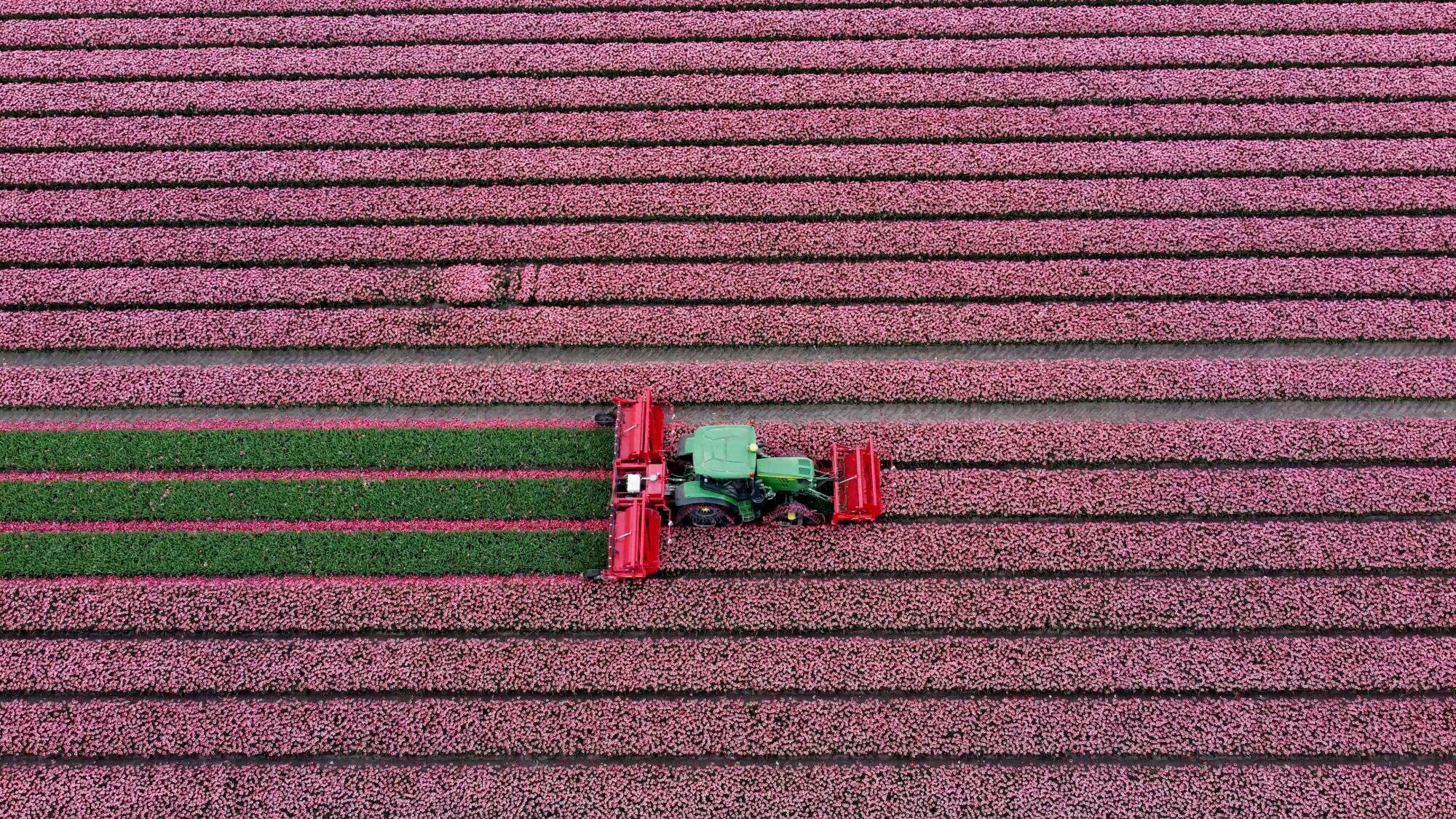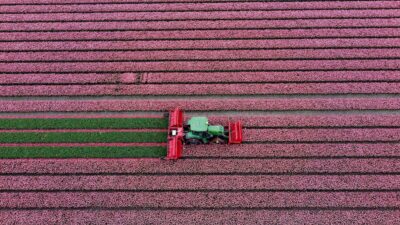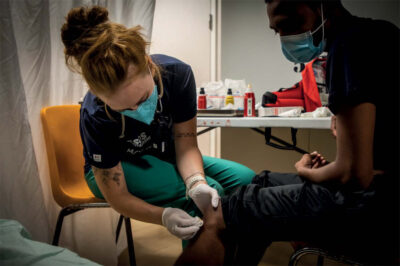Main content
Fatima Hassan is a South African human rights lawyer and social justice activist. She is the founder of the Health Justice Initiative. In 2022, Hassan received the Calgary Peace Prize for her commitment to global health equality and her fight against racism and legacies of colonialism. Hassan’s efforts to combat injustices have been especially apparent in her work regarding HIV/AIDS and, more recently, in how she challenged global COVID-19 vaccine inequality. Fatima Hassan was interviewed by Emma Pieters.

It is March 2020, COVID-19 is now officially a ‘global pandemic’, and some people argue that the world as we know it has ceased to exist. Fatima Hassan is not one of them. To her, the way the world functions appears all too familiar. Initial statements and displays of solidarity are soon replaced by actions marked by selfishness, Hassan observes. Even though the situation is indeed a novel one, the way that the Global South and Global North interact much resembles pre-pandemic times. Many of the previous mechanisms of our global health systems prevail. Despite the new circumstances urgently requiring alternative measures, the international patents regimes largely persist to constrain vaccine manufacturing, and pharmaceutical firms continue to dictate medicine production and distribution. This article retells the story of the COVID-19 pandemic through the eyes of Fatima Hassan, taking South Africa as a starting point.
Solidarity quickly dies out
Just a few days after COVID-19 is coined a ‘global pandemic’ by the World Health Organization (WHO), South African President Cyril Ramaphose declares a ‘national state of disaster’. [1,2] It is during these early days of the pandemic that sentiments of solidarity dominate. In a debriefing on the pandemic, WHO Director-General Tedros Adhanom Ghebreyesus states: “Solidarity must be at the centre of our efforts to defeat COVID-19”. [2] Initially, this principle seems to translate into actions. South Africa, for example, receives medical tools from China in April 2020, including 61,000 masks, 3,000 protective suits and 11,000 pairs of surgical gloves. [3] Moreover, it is around this time that the Solidarity Response Fund is created to raise money to help countries respond to the pandemic, and that COVID-19 Vaccines Global Access (COVAX) is established “to accelerate the development and manufacture of COVID-19 vaccines and to guarantee fair and equitable access for every country in the world”. [4,5] But as Hassan explains, these efforts soon reach their limits: “So the initial idea was that there would be solidarity; there was a lot of public funding and investment in accelerating vaccine research, and people were encouraged to participate in clinical trials. But what you then saw was a total refusal to share either supplies or knowledge – even with people on the frontline, or with people with limited mobility or older than 70 years.”
As the pandemic progresses, pharmaceutical firms and governments from the Global North prove unwilling to cooperate with initiatives aimed at equal access to medical resources. The reluctance to exchange knowledge and supplies makes it hard, if not impossible for COVAX – targeted at vaccine equity – to realize its goals. Moreover, as Hassan points out, countries from the Global North circumvent COVAX in their pursuit of vaccines: “The Global North entered into its own bilateral agreements with the pharmaceutical companies – some of them bypassing COVAX, some of them drawing on COVAX supplies. So the mechanisms meant to address equitable allocation, and voluntary cooperation of the industry did not materialize for a long time. It was tied into a system where the big pharmaceutical companies were calling all the shots.”
The WHO COVID-19 Technology Access Pool (C-TAP) made another effort to facilitate vaccine technology exchanges, but the pharmaceutical firms that were among the first to develop a vaccine, such as Pfizer and Moderna, shared their knowledge only sparsely. Hassan: “The Global South said, ‘Look there is existing manufacturing capacity in many parts of the world, we can help you scale up’. But the companies refused. The WHO created C-Tap, where the exchanges would be on the pharma companies’ terms and voluntary. There would be a lot of controls or sitting down with the companies, and they were to get royalties.” But, as Hassan points out, every single manufacturer has refused to even enter C-Tap.
As countries from the Global North were making sure to secure their own supplies, South Africa found itself in a disadvantaged situation – ‘trying to play catch-up to the rest of the world’, as Hassan puts it. In March 2021, it is reported that political entities ‘representing only 16% of the global population have secured 70% of the available doses for the five leading vaccines in 2021’. [6] Consequently, only a few countries had vaccinated significant parts of their population, while other countries were still unable to administer their first shot. For example: by 24 May 2021, South Africa had vaccinated 642,382 (1.1%) of its population in contrast to 5.67 million (32.3%) in the Netherlands.
Too little too late
According to Hassan, both the access to resources and the timing of when resources were made available have been essential in dealing with COVID-19. “The timing of how fast or quickly you could vaccinate large numbers of people determined whether your borders could remain open, whether your economy could carry on, if you could flatten the curve, and if you could manage lockdowns. So the timing in this pandemic of access to resources such as vaccines obviously has been critical and important.” Hassan elaborates: “In the last part of 2021, you saw a lot of donations of supplies coming in with very short expiry dates, and of vaccines that were no longer being used in the Global North. It is not helpful if you’re going to give us Johnson & Johnson vaccines now – even if it would have been before. What we need right now is an Omicron-class vaccine.”
South Africa was caught up in a situation in which it was responding to the pandemic without all the available tools that European countries or the US for example had. Hassan: “This meant that there was a drip-feed of supplies, not just of vaccines, but also of other elements that you needed to contain the menace of the pandemic, including diagnostic and testing kits as well as treatment options”. Even in the case of vaccines manufactured in South Africa, Europeans were prioritized over South Africans. In August 202, it was exposed by the New York Times that while South Africa (with then only 7% of its population vaccinated) had still not received a major part of the 31 million doses it ordered from Johnson & Johnson, the pharmaceutical firm was exporting millions of doses from its South African plant to Europe. [7]
An important part of the problem has been the global dependency on just a few vaccine manufacturers, explains Hassan. “If you don’t have enough manufacturers in the system in the middle of a global pandemic, and you need to vaccinate not a few million people but a few billion people at the same time, then you maybe need more manufacturers in the system to help you scale up. Because if your plant goes down, or if there is an interruption in the supply chain, you’ve basically put all your eggs into one basket.” To illustrate her point, Hassan refers to production deficiencies with the Johnson & Johnson plant in Baltimore in 2021, and with the Covaxin plant in Hyderabad more recently. [8,9]
Silver linings: the mrna hub and the trips waiver
More than a year into the pandemic, as initiatives such as C-TAP and COVAX are still failing to deliver, and many countries in the Global South are still struggling with access to medicine supplies and vaccines, the mRNA hub is established. The hub, which is located at Afrigen, Cape Town, is aimed at technology transfer and ‘build[ing] capacity in low- and middle-income countries to produce mRNA vaccines’. [10] The creation of this mRNA hub forms a concrete attempt for the Global South to gain control over the vaccine production and distribution. Especially with the temporary loosening of intellectual property in June this year – almost two years after it was first proposed by South Africa and India – the functioning of the mRNA hub has been further enabled (although the TRIPS waiver has been criticized for being very limited). [11] Hassan: “Both Pfizer-BioNTech and Moderna have refused to cooperate with the mRNA Hub. And the hub I think is a combination of everything that went wrong in this global pandemic, with the Global South saying, ‘Right, enough, we’re going to try a totally different model of generating knowledge, of product development, and of putting potential vaccines – not just for COVID but maybe even HIV – onto the market.” Equity is only possible if the Global South is no longer dependent on the ‘goodwill’ of the Global North. Hassan: “If you’re relying on the existing model, which is really heavily influenced by Global North countries and the pharmaceutical industry, then you’re not going to ensure equity”. As the case of South Africa during the COVID-19 pandemic has shown – and is still showing – the way that vaccines are commonly produced and distributed frustrates vaccine equity. But according to Hassan, the establishment of the mRNA hub and the TRIPS waiver are silver linings. “So the bottom line is that there is now this amazing effort called the mRNA hub. And if it can replicate the mRNA vaccine, without the supporting cooperation of Moderna and Pfizer, then I think that would be one of the more heartening and more positive aspects of this pandemic, with which we can show that the Global South can basically do this without these big pharmaceutical companies and without the vested interests trying to prevent it.”
References
- South Africa Health Department. Statement by President Cyril Ramaphosa on measures to combat COVID-19 pandemic. 2020 March 15. Available at: https://sacoronavirus.co.za/2020/03/15/statement-by-president-cyril-ramaphosa-on-measures-to-combat-covid-19-epidemic/
- World Health Organization. WHO Director-General’s opening remarks at the media briefing on COVID-19 – 18 March 2020. 2020 March 18 Available at: https://www.who.int/director-general/speeches/detail/who-director-general-s-opening-remarks-at-the-media-briefing-on-covid-19—18-march-2020
- SAnews. SA receives medical supplies from China. 2020 April 14. Available from: https://www.sanews.gov.za/south-africa/sa-receives-medical-supplies-china.
- World Health Organization. WHO, UN Foundation and partners launch first-of-its-kind COVID-19 Solidarity Response Fund. 2020 March 13. Available at: https://www.who.int/news/item/13-03-2020-who-un-foundation-and-partners-launch-first-of-5.
- World Health Organization. COVAX: working for global equitable access to COVID-19 vaccines. [cited 2022 November 2]. Available at: https://www.who.int/initiatives/act-accelerator/covax.
- The Lancet. Access to COVID-19 vaccines: looking beyond COVAX. 2021 Mar; 397; 941. Available at: https://www.thelancet.com/pdfs/journals/lancet/PIIS0140-6736(21)00617-6.pdf.
- Robbins R, Mueller B. Covid vaccines produced in Africa are being exported to Europe. The New York Times. 2021 August 16. Available at: https://www.nytimes.com/2021/08/16/business/johnson-johnson-vaccine-africa-exported-europe.html.
- Pulla P. Exports of an Indian COVID-19 vaccine halted after WHO finds problems at manufacturing plant. Science. 2022 April 7. Available at: https://www.science.org/content/article/exports-indian-covid-19-vaccine-halted-after-who-finds-problems-manufacturing-plant
- LaFraniere S, Weiland N, Stolberg SG. The F.D.A. tells Johnson & Johnson that about 60 million doses made at a troubled plant cannot be used. The New York Times. 2021 June 11. Available at: https://www.nytimes.com/2021/06/11/us/politics/johnson-covid-vaccine-emergent.html,
- World Health Organization. The mRNA vaccine technology transfer hub. [cited 2022 November 1]. Available at: https://www.who.int/initiatives/the-mrna-vaccine-technology-transfer-hub.
- Furlong, A, Aarup, SA, Horti S. Who killed the COVID vaccine waiver? Politico. 2022 November 10. Available at: https://www.politico.eu/article/covid-vaccine-poor-countries-waiver-killed/.


















































